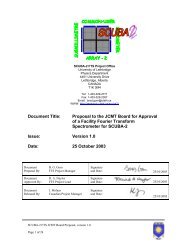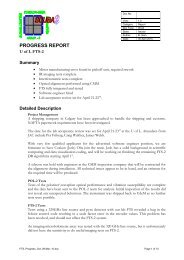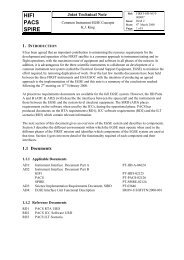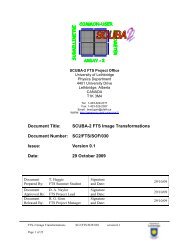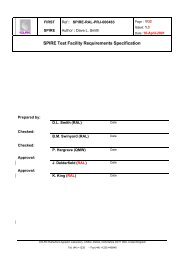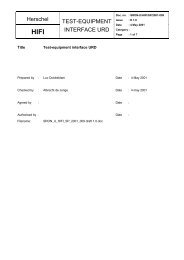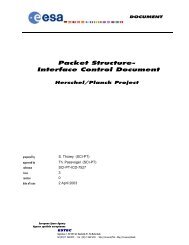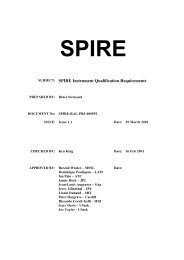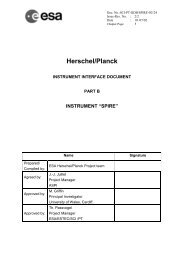gambling in alberta - Research Services - University of Lethbridge
gambling in alberta - Research Services - University of Lethbridge
gambling in alberta - Research Services - University of Lethbridge
Create successful ePaper yourself
Turn your PDF publications into a flip-book with our unique Google optimized e-Paper software.
Post-Script: Barriers to Participation<br />
The present research project was prov<strong>in</strong>cially mandated, and the Alberta Gam<strong>in</strong>g and Liquor<br />
Commission <strong>in</strong>structed all cas<strong>in</strong>o operators, by a letter, to participate with researchers to assist<br />
<strong>in</strong> determ<strong>in</strong><strong>in</strong>g the cost/benefit <strong>of</strong> <strong>gambl<strong>in</strong>g</strong> <strong>in</strong> Alberta. Several barriers to successful First<br />
Nations participation <strong>in</strong> the project obstructed researcher’s data collection abilities. Reasons<br />
for not participat<strong>in</strong>g range from fears that the project, once completed, could lead to cas<strong>in</strong>o<br />
closures; and that First Nations’ possess a self-govern<strong>in</strong>g right to keep researchers from<br />
enter<strong>in</strong>g their communities. The follow<strong>in</strong>g three categories were thematically derived after<br />
review<strong>in</strong>g the collected data compiled from personal researcher experiences, focus groups,<br />
<strong>in</strong>formal <strong>in</strong>terviews, and newspaper contents analysis.<br />
Navigat<strong>in</strong>g First Nations Government Bureaucracy<br />
The data collection process was significantly hampered by an <strong>in</strong>ability to ga<strong>in</strong> band council<br />
approval to contact community members as study participants. The purpose <strong>of</strong> approach<strong>in</strong>g<br />
the band councils was to show proper respect for their govern<strong>in</strong>g authority. We spent<br />
significant time navigat<strong>in</strong>g the various band council bureaucracies <strong>in</strong> search <strong>of</strong> the <strong>in</strong>dividual<br />
who could grant researchers community access; or who was assigned the task <strong>of</strong> br<strong>in</strong>g<strong>in</strong>g our<br />
concerns before the chief and council. While difficulties were experienced generally, our<br />
experience with the Stoney Nakoda First Nation is <strong>in</strong>structive.<br />
Start<strong>in</strong>g <strong>in</strong> May 2008, a project researcher contacted the band council secretary and asked to<br />
be put through the appropriate <strong>in</strong>dividual to review our requests. Over a period <strong>of</strong> several<br />
months, dozens <strong>of</strong> telephone messages were left with various council members. None were<br />
returned. When we f<strong>in</strong>ally secured a contact that <strong>in</strong>dividual quit with<strong>in</strong> weeks, and the new<br />
contact showed little <strong>in</strong>terest <strong>in</strong> the project. To those who raised concerns that participatory<br />
action research or similar methodologies were not be<strong>in</strong>g utilized, we <strong>in</strong>formed them that we<br />
had made allowance for hir<strong>in</strong>g community <strong>in</strong>dividuals to facilitate data collection.<br />
All <strong>of</strong> this produced limited returns. We expanded our limited contact list, and thus began to<br />
make progress with hopes <strong>of</strong> produc<strong>in</strong>g a face-to-face meet<strong>in</strong>g. However, a band council<br />
election was called result<strong>in</strong>g <strong>in</strong> a number <strong>of</strong> our contacts be<strong>in</strong>g voted out <strong>of</strong> <strong>of</strong>fice. The new<br />
chief and council did not want to hear from us immediately, and despite promises to eventually<br />
do so our requests to present to band council were all denied. When an <strong>in</strong>vitation was<br />
extended to appear before chief and council, it was <strong>of</strong>ten delivered with little more than an<br />
hour’s notice. F<strong>in</strong>ally, several untimely deaths and serious accidents occurred with<strong>in</strong> the<br />
community result<strong>in</strong>g <strong>in</strong> postponed or cancelled meet<strong>in</strong>gs.<br />
One year <strong>in</strong>to the project no progress had occurred at Stoney. It was the last First Nations<br />
cas<strong>in</strong>o to open, mean<strong>in</strong>g that there was little to no data to draw from to determ<strong>in</strong>e the cas<strong>in</strong>o’s<br />
socio-economic impacts to the First Nation itself or nearby communities such as Canmore and<br />
Banff.<br />
253



